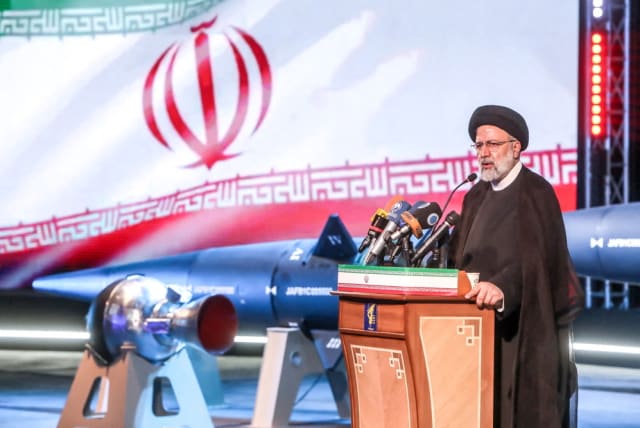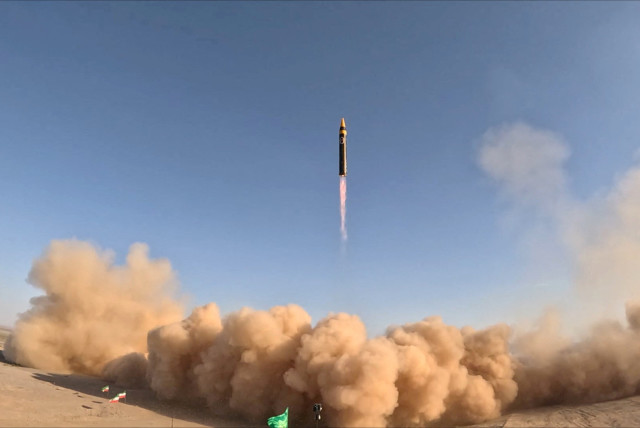US, UK, France warn UNSC on Iranian drones, uranium enrichment

The United States, United Kingdom, and France warned the UN Security Council about Iran providing weapons to Russia.
The United States, France, and the United Kingdom warned the United Nations Security Council about Iran’s sale of missiles and armed drones to Russia and its dangerous enrichment of uranium, which would allow it to produce nuclear weapons.
“Just last weekend, public reports indicate that Russia used eight Iranian-made Shahed-136 drones to terrorize Kyiv,” US Ambassador Robert Wood told the Security Council when it met in New York on Thursday to discuss Iranian compliance with the 2015 Joint Comprehensive Plan of Action (JCPOA), otherwise known as the Iran deal. The council has oversight of the deal, through Resolution 2231.
Wood charged that Iran had violated the resolution through its sale of armed drones and missiles to Russia and that Moscow, which is also a signatory to the deal, has similarly abrogated the agreement.
“Russia’s acquisition of hundreds of Iranian drones and now production* of those drones on its own territory... is a flagrant violation of Resolution 2231. We should not be shy about condemning this destabilizing and dangerous behavior,” Wood said.
He called on UN Secretary-General Antonio Guterres’ office to investigate the issue of armed Iranian-made drones.Wood also took issue with reports that Iran had tested a medium-range ballistic missile and pledged that the Biden administration would “block the proliferation of sensitive ballistic missile technology to and from Iran. We will also continue to sanction companies and traders contributing to this threat.”
Russia's war, Iran's weapons
French Ambassador Nicolas de Rivière and his British counterpart Barbara Woodward also focused heavily on Iranian violations of its nuclear obligations under the deal.
“Iran’s enriched uranium stockpile currently exceeds JCPOA limits by more than 21 times,” Woodward said.“Its enrichment capabilities have expanded to over 2,500 powerful advanced centrifuges, suitable for nuclear weapons purposes,” she explained.
“Building this capacity has given Iran irreversible gains in technical knowledge, which the JCPOA sought to limit,” Woodward added.
Iran’s nuclear program has never been this advanced, de Riviere said.Russia’s Ambassador to the UN Vasily Nebenzya rejected the charge that his country was using Iranian-made weapons in its war on Ukraine.
Such accusations, he charged, were part of an effort to sabotage efforts to reinstate the JCPOA, which has been defunct since 2018, when the former Trump administration left the deal.
The Biden administration had initially sought to revive the deal, but those efforts came to a halt last year.
Nebenzya said Russia was particularly concerned that Western countries were trying to blackmail Iran by threatening to “snap back” the crippling international sanctions that had been lifted when the deal was put in place in 2015.
“There neither is a legal nor procedural justification for this. We caution them against” such “perilous steps,” Nebenzya said.
Along with Russia, the US, the UK, China, France, and Germany – are all signatories to the 2015 Iran deal.
Jerusalem Post Store
`; document.getElementById("linkPremium").innerHTML = cont; var divWithLink = document.getElementById("premium-link"); if (divWithLink !== null && divWithLink !== 'undefined') { divWithLink.style.border = "solid 1px #cb0f3e"; divWithLink.style.textAlign = "center"; divWithLink.style.marginBottom = "15px"; divWithLink.style.marginTop = "15px"; divWithLink.style.width = "100%"; divWithLink.style.backgroundColor = "#122952"; divWithLink.style.color = "#ffffff"; divWithLink.style.lineHeight = "1.5"; } } (function (v, i) { });

